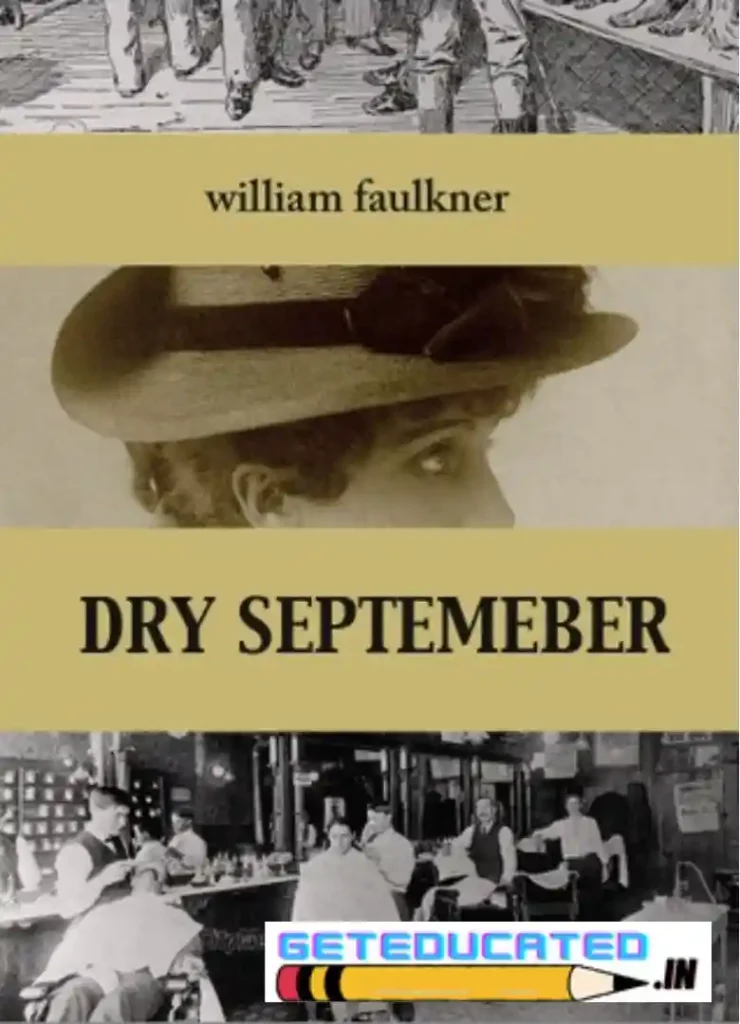
“Dry September” closes with John McLendon’s returning to his “birdcage” home at midnight and brutally confronting his wife. Hearing his question, “Haven’t I told you about sitting up like this, waiting to see when I come in?” we wonder where and what he must have been doing the other times, and how often his wife must endure his abusive behavior. The sadism that was revealed in his slashing out at Will continues in his sadistic treatment of his wife when he “half struck, half flung her across the chair.”
Mrs. McLendon’s seemingly passive acceptance of her husband’s abuse increases our sympathy for her. By ending the story with such a disturbing view of her as a victim, Faulkner reiterates the victimization of many of his characters, most especially Will. Our final glimpse of McLendon is not of the heroic American decorated for valor, but of a mean, vicious, and violently sadistic bigot. Ironically, he kills a man to protect the so-called sanctity of Southern white women, yet he treats his own wife as a piece of property, to do with as he pleases. The White Goddess concept is an abstract ideal, and that is all it is — an ideal that fails miserably in real life.
The ending line reinforces the idea we have seen throughout “Dry September” of a cold, lonely, and unjust world. One meaning of “stricken” is to be negatively affected especially by an illness. The world of Jefferson, the fictional Mississippi town in which the story is set, is definitely stricken, stricken by racism, by conflicts between its classes, and by violence and abuse all around. Throughout the story we get a general sense that things aren’t right here.
The final lines call on that sense by communicating the distance between the diseased world (of which Jefferson is only a microcosm) and the celestial, natural world of the moon and stars. The moon and stars seem to exist harmoniously with their environments and each other. By contrast, the inhabitants of Jefferson – with the dust, the heat, and all their social and cultural problems – are in a state of disharmony with their surroundings and each other.
We think it’s pretty clear that Minnie wasn’t raped – even McLendon acknowledges this when he says, “Happen? What the hell difference does it make? Are you really going to let the black sons get away with it until one really does it?” (1.36). A lot of information is packed into this quote. What McLendon seems to be saying is that Will did something improper (even looking at a white woman would have been enough) and needs to be taught a lesson, and, more importantly, turned into an example of what not to do. McLendon is also evoking a damaging stereotype, or set of stereotypes lurking around in southern US towns during Faulkner’s time – that black men are dangerous sexual predators, and that they prey on white women. According to this thinking, the only thing that stops black men from raping white women is the white men keeping the black men in check. This is ludicrous to today’s reader, but in 1931 when the story was first published, this wasn’t an uncommon mode of thought. Further evidence that there was no rape is the fact that the police were never involved. If a physical violation were committed by Will, the police probably would have been called before the barber shop scene. McLendon is adamant about not involving the police. This might be because he knows that Will can’t be guilty that under the law. McLendon is a vigilante (a person who takes the law into his hands); in his mind he’s filling the gap between law and justice. He isn’t concerned with what Will did or did not do, but with the rumor. He wants to let people know that not even rumors of black men and white women will be tolerated
in the community.
As to whether Will sexually harassed Minnie in some way, or made some sexual advance toward her, we can’t be completely sure. We don’t know very much about Will, and know even less about how he might know Minnie. But, we can’t completely rule out the possibility that he made a sexual advance toward Minnie. At the very least we can admit the possibility that she was made uncomfortable by something that he did. Will’s character witness is Hawkshaw, and while Hawkshaw is a sympathetic character in many ways, his reasoning on why Will couldn’t have done anything to Minnie is based on faulty logic. In fact, it’s the same kind of logic that McLendon uses unfairly against Will. Hawkshaw’s defense of Will is based on his vision of Minnie as an unattractive and older woman, who never has sex, and who is not capable of attracting any man. Henry further assumes that she is capable of falsely accusing men of sexually abusing her. The fact that there have been past rumors to this effect shouldn’t count as evidence. Hearsay would never be admitted as evidence in a court of law. But the fact that this argument is based on hearsay doesn’t make it untrue. Section 4 of the story, which features Minnie, suggests that Minnie is constantly attempting to sexualize herself, and that she longs for male attention. Unfortunately, the society in which she lives has deemed her too old, unattractive, and undesirable to be allowed to have sex or other romantic relationships with men. There is no acceptable sexual outlet for this woman. She is scorned because she didn’t get married when she was supposed to do so. Section 4 strongly suggests Minnie started the rumor, with a little help from her friends, in a confused attempt to gain sexual attention from the men in town.
We can speculate about all these things, but the fact remains that we don’t have enough evidence to be sure about anything. We don’t even know whether Will is dead or alive at the end of the story, though we can be sure that something terrible happened to him. We think that Faulkner left things uncertain so as not to distract from the main issues of the story. It seems as if he were revealing that the social norms in the southern United States in the late 1920s and 1930s resulted in a corrupt and diseased society where justice was unavailable, and where gossip became truth. The uncertainty in his story places the reader in the same position as the townspeople: the position of not knowing what happened. We could interpret “Dry September” as a warning against drawing conclusions based on assumptions instead of facts, both in our lives, and in our readings.
Now that we’ve addressed the uncertainly of the ending, we can look briefly at the actual ending of the story, meaning Section 5. This is where things get ironic. In this brief scene we see John McLendon physically and emotionally abuse his wife, and most likely, not for the first time. This scene links McLendon’s violence against Will with McLendon’s violence against his wife. In so doing, we get the sense that McLendon’s actions against Will are not based in love and concern for Minnie, or for women in general. Rather, his actions seem to be firmly rooted in his irrational fear and hatred of black men and women, and in his general tendency toward violence and domination.
